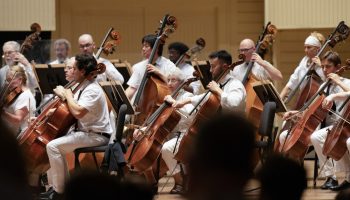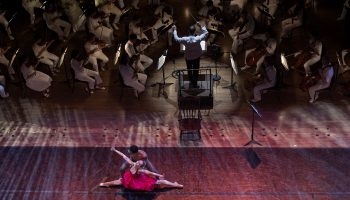Fancy Free
Leonard Bernstein
Leonard Bernstein was born in Lawrence, Massachusetts, on Aug. 25, 1918, and died in New York City on Oct. 14, 1990. His career centered on musical composition and conducting, but he was also a gifted pianist. He preferred to call himself simply “musician.” Bernstein was, as his biography in the New Grove Dictionary puts it, “the most famous and successful native-born figure in the history of classical music in the USA.” His influence on a generation of musicians was immeasurable. Furthermore, his body of work successfully spanned and connected the sometimes disparate worlds of the concert music and musical theater. His legacy continues through his music, recordings, videos, and many books. His 1944 ballet score, “Fancy Free,” is the result of a collaboration with choreographer Jerome Robbins, with scenery by Oliver Smith, costumes by Kermit Love and lighting by Ronald Bates. Its first performance took place at the (old) Metropolitan Opera House on April 18, 1944. This was the same year that marked Bernstein’s spectacular debut as substitute for the ailing Bruno Walter as conductor for a concert of the New York Philharmonic, an event that placed him firmly on the map of American music. The New York City Ballet (predecessor of the American Ballet Theatre) premiere took place on Jan. 31, 1980. Parts of the score were used by the film director and producer, Alfred Hitchcock, in “Rear Window” (1954), starring James Stewart and Grace Kelly.
Bernstein’s score to “Fancy Free,” although complete in itself, may also be thought of as the work that gave rise to the better-known musical, On the Town, produced in the same year. The 1949 film version of On the Town, featuring the singing and dancing of Gene Kelly and Frank Sinatra, removed much of Bernstein’s original music, citing it as too “complex and operatic,” and substituting numbers penned by Roger Edens. Understandably, this caused much consternation on Bernstein’s part, leading him to boycott the film.
The scenario for the original ballet is as follows:
It is wartime. Three sailors on liberty arrive at a New York City bar with two of the sailors conning the third into paying for their drinks. The trio heads outside in search for female companionship. As a beautiful girl passes by, they attempt to gain her attention. She plays hard to get and escapes, with two of the sailors in hot pursuit. The remaining one encounters another beautiful woman, and invites her to have a drink with him. He woos her with a pantomime demonstrating his military adventures, and they dance a pas de deux. The other two sailors return with the first girl, who recognizes the second one as her friend. The sailors realize that the three men are accompanied by only two women. They all dance, changing partners and leaving each one of the sailors left in turn to dance by himself. The three sailors decide to hold a contest, leaving the loser dateless. Each sailor performs a solo variation (a galop, a waltz and a danzon). The women are unable to decide and the men start to fight. In the midst of the melee, the women fearfully take flight. Now that all three men are dateless, the sailors cease their hostilities, have another drink, and head outside. Yet another beautiful woman passes by, and the trio take off after her.
Bernstein’s music for “Fancy Free” is a perfect reflection of the composer himself. Its seven movements (movement six includes the three solo variations) demonstrate his eclecticism, now jazzy and exuberant, now dramatic or lyrical, all brilliantly orchestrated. “Fancy Free” is a wonderful evocation of the energy and optimism of American culture of the 1940s and ’50s.
Mango Suite
Derek Bermel
American composer, conductor and clarinetist Derek Bermel was born in New York City in 1967. Artistic director of the American Composers Orchestra at Carnegie Hall, Bermel is also director of Copland House’s emerging composers institute, Cultivate, served as composer-in-residence at the Mannes College of Music, and enjoyed a four-year tenure as artist-in-residence at the Institute for Advanced Study in Princeton. Alongside his international studies of ethnomusicology and orchestration, an ongoing engagement with other musical cultures has become part of the fabric and force of his compositional language, in which the human voice and its myriad inflections play a primary role. He has received commissions from the Pittsburgh, National, Saint Louis, and Pacific symphonies, Los Angeles Philharmonic, Chamber Music Society of Lincoln Center, WNYC radio, La Jolla Music Society, Seattle Chamber Music Festival, Eighth Blackbird, Guarneri Quartet, Music from Copland House and Music from China, Dutch ensemble orkest de ereprijs, violinist Midori and electric guitarist Wiek Hijmans, among others. The Boston Globe wrote, “There doesn’t seem to be anything that Bermel can’t do with the clarinet.” His many honors include the Alpert Award in the Arts, Rome Prize, Guggenheim and Fulbright Fellowships, American Music Center’s Trailblazer Award, and an Academy Award from the American Academy of Arts and Letters; commissions from the Koussevitzky and Fromm music foundations, “Meet the Composer” and the Mary Flagler Cary Charitable Trust; and residencies at Yaddo, Tanglewood, Aspen, Banff, Bellagio, Copland House, Instituto Sacatar and Civitella Ranieri.
“Mango Suite” is the result of a commission from Chautauqua Institution based upon the 1984 award-winning book The House on Mango Street, by the Mexican-American author Sandra Cisneros. The work is part of an inter-arts collaboration that brings together the Chautauqua Symphony Orchestra with other components of the visual and performing arts, including VACI, the Dance and Voice programs, and members of Chautauqua Theater Company. CSO Music Director and conductor Rossen Milanov knows Bermel’s music and contacted the composer to see if he would provide a suitable inter-arts work. Bermel signaled to Milanov his long-standing interest in creating a musical work based on Cisneros’ book. This response spawned the presentation we will experience this evening.
The House on Mango Street is the story of Esperanza Cordero, a young Latina girl growing up in the Latino section of Chicago — a neighborhood of “hard realities and harsh beauty. Esperanza doesn’t want to belong — not to her rundown neighborhood, and not to the low expectations the world has for her.” As Esperanza matures, she describes the people in her life through a series of terse vignettes, some of which reflect Cisneros’ own life experiences. One of these includes a sexual assault. Because of the nature of some of its chapters, the book has faced controversy with various school boards. It has also been hailed as an important vehicle for transmitting the Latin-American experience to a broader audience. The House on Mango Street is a critically acclaimed New York Times best-seller and has been adapted into a stage play by Tanya Saracho.
Bermel and the inter-arts team has created a compelling panoramic “cycle” that blends song and dance with dramatic reading episodes filled with humor, pathos and dramatic truth. Its eight musical numbers open with a waltz-like song. “A House of My Own,” for soprano and orchestra. The next numbers are titled “Cathy Queen of Cats” and “Darius & the Clouds,” featuring singing and spoken dialogue. This goes directly into “Hips,” a funny jumping rope narration with funky musical riffs (“Chi-Town Jump”). The scenarios continue, ending with a reprise of the touching “A House of My Own.”
David B. Levy is professor of music at Wake Forest University in Winston-Salem, North Carolina. He will present a pre-concert lecture on Saturday’s program at 6:45 p.m. in the Hurlbut Church sanctuary.




